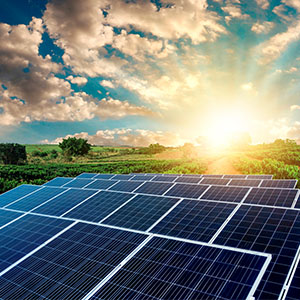“Do Latin Americans see China as a panda or a dragon? A lovely and gentle animal that offers opportunities for development, or a beautiful and powerful being who can swallow the region? I believe that the idea of threat gradually evolves into a more balanced view.”
Evan Ellis, North American political scientist, teaches at the US Army War College
"We have a new elephant in the room; China, while the old elephants, which shaped the world after World War II, are in a crisis.”
Bernardo Sorj, sociologist and director of Edelstein Center for Social Policies (Rio de Janeiro)
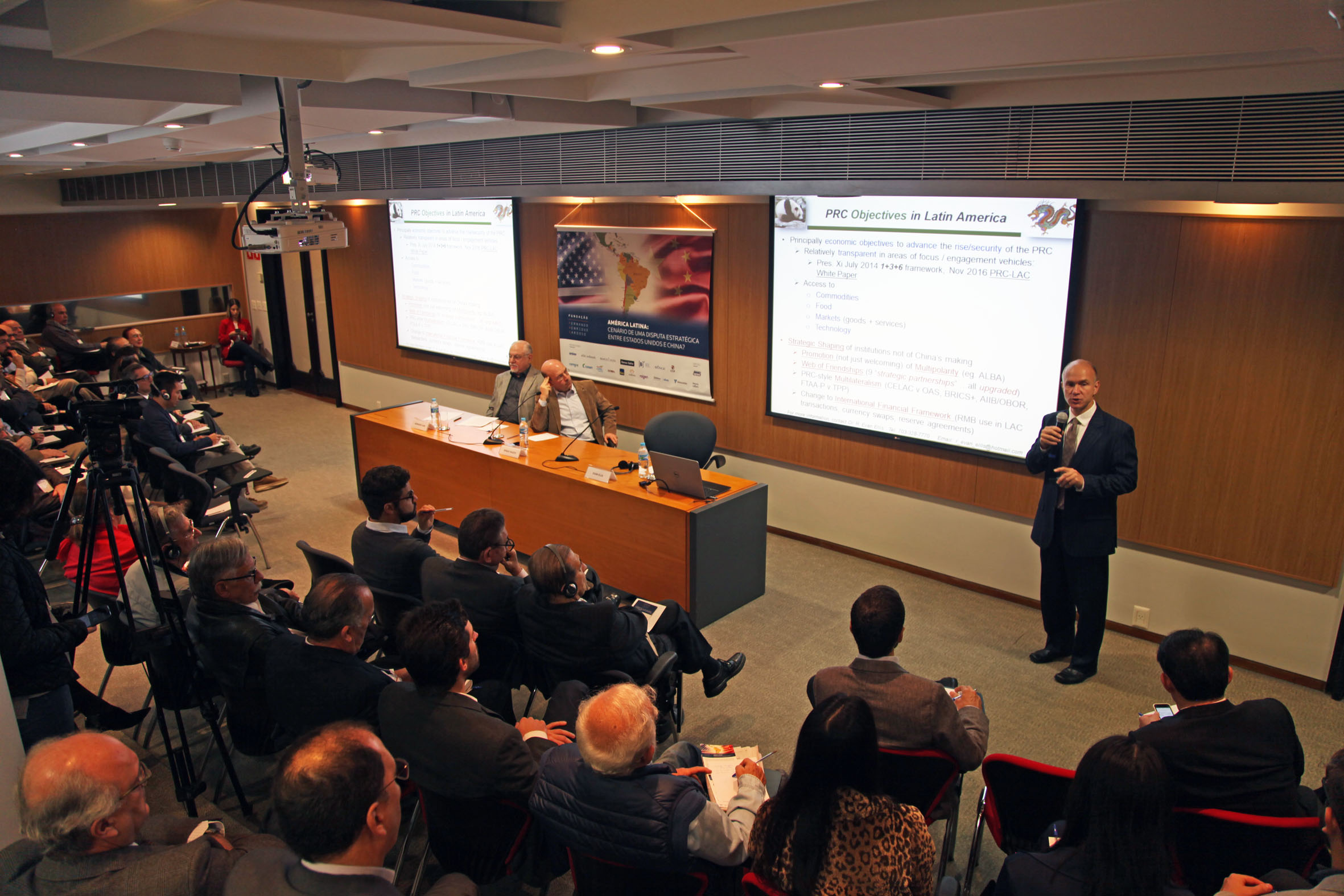
“Brazil is a key country for Chinese investments in Latin America and both nations can develop many projects together. However, it is important that Brazil, which is currently in a vulnerable position, strengthens itself, because this partnership requires strong institutions and companies from both sides. Only then will Brazil be able to make the most of the opportunities that China has to offer”, said American political scientist Evan Ellis, a research professor of Latin American Studies at the Institute of Strategic Studies at the US Army War College, in a lecture at the Fernando Henrique Cardoso Foundation, in Sao Paulo.
According to figures presented by the professor and researcher specialized in the relationship between Latin America and China and in matters related to security in the region, Brazil is currently the destination of 48.2% of the total resources invested in the region, followed by Argentina (12.3 %) and Peru (10.5%). Of the approximately US$ 55 billion (dollars) invested, US$ 21 billion has been invested since 2017, and there is another US$ 71 billion already announced for the coming years. In all, China has invested US$ 113 billion in Latin America since 2001.
Besides the growing importance of Brazil as the focus of Chinese investments, there is another strategic trend in the Sino-Latin American relationship. A trend of intensification of technological cooperation in the areas of telecommunications, nuclear, space and satellites, surveillance and control.
In Brazil’s case, the investments spill to various sectors, among them: construction, logistics, electricity, renewable energy (wind, solar and hydroelectric), agriculture, water resources, mining, oil, telecommunications and even medicine. See an updated inventory of Chinese investments in the country and Latin America in the Related Content section, on the right of this page.
Transparency and objectivity
According to the author of the book “China on the Ground in Latin America” (Edit Palgrave Macmillan US, 2014), in recent years Beijing has been objective and transparent in relation to its objectives in Latin America, which, in addition to the commercial intensification (import and export), include large investments and loans and are explained in a “white paper” published in November 2016.
The investment policy aims to ensure that the new Asian power obtains sufficient raw materials and commodities for its more than 1.4 billion inhabitants, as well as access to new markets (products and services) and technological developments. “In order to become a truly modern country, China knows that it needs to have a diversified economy with a strong technological capacity”, stated Ellis.
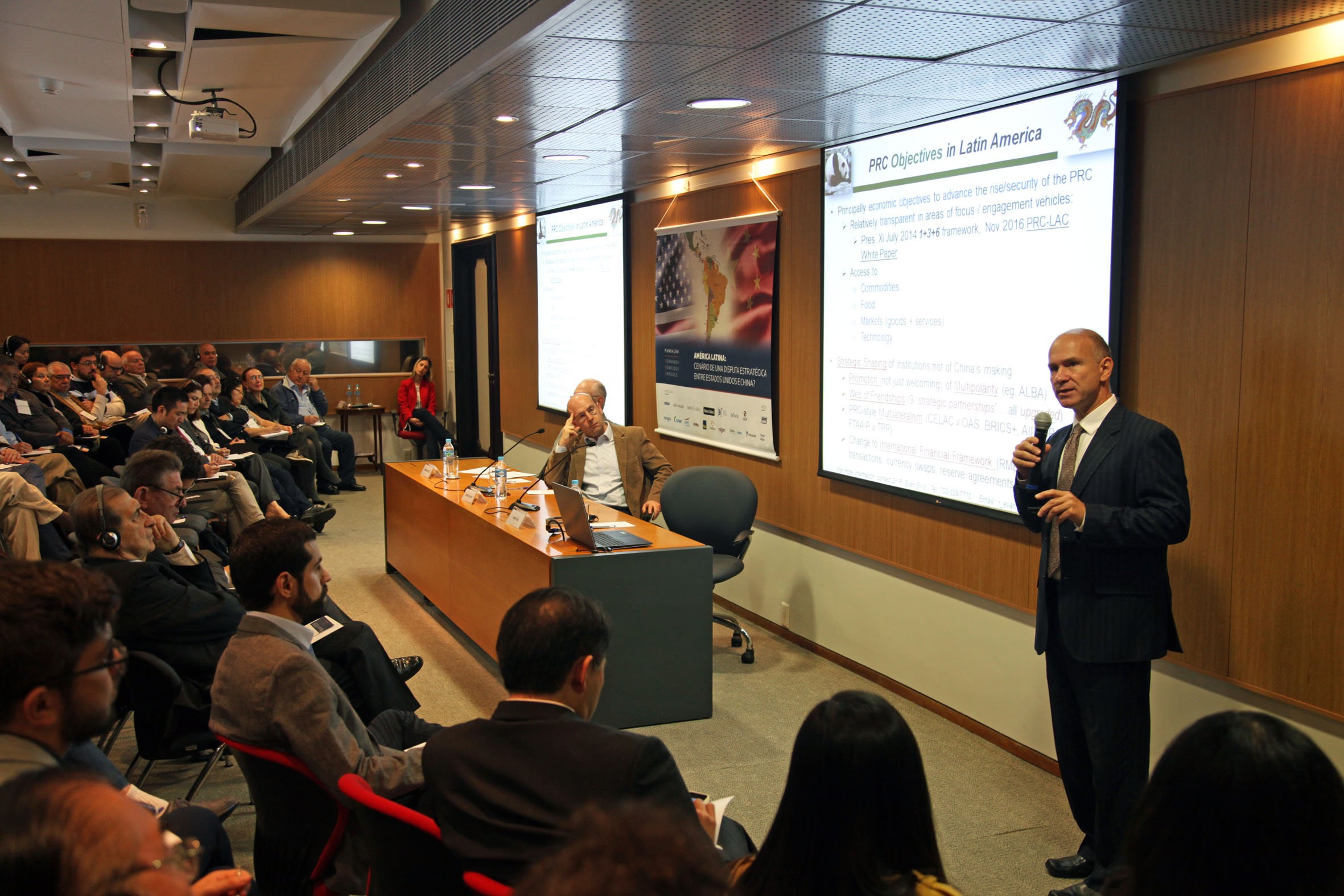
'Chinese Multilateralism'
At a time when the United States, under Donald Trump’s presidency, becomes more protectionist compared to the rest of the world - and Europe is also facing a strengthening of nationalist movements (see more on these trends below) - Beijing invests in the creation of new international financial institutions, which include the new banks of development AIIB (Asian Infrastructure Investment Bank (AIIB) and NED (New Development Bank), also known as the Bank of BRICs, both with significant volumes of Chinese capital.
It develops initiatives such as the infrastructure megaproject One Belt & One Road and tries to boost the Free Trade Area of Asia- Pacific (FTAAP) led by China, as opposed to the Transpacific Partnership (TPP) a major trade agreement announced in 2015 during the Obama Administration, but which suffered a heavy blow after Trump announced the withdrawal of the United States.
As part of its strategy to “shape the world more appropriately to China's rise and continued growth”, Beijing also seeks to transform its currency, the RMB, into an international currency increasingly accepted in commercial transactions, foreign exchange operations and an integral part of international reserves held by countries around the globe.
Panda or dragon?
Ellis utilized two Chinese symbols to talk about the Latin American perception of the opportunities and risks of China's growing presence in the region; the panda and the dragon. “Would it (China) be a lovely and kind animal that offers opportunities for development, or a beautiful and powerful being who can swallow the region?” Ellis asked.
According to the speaker, China is “a partner different from those of Western countries (such as the US and European nations present in Latin America for several decades or even centuries), sometimes more difficult, but is committed to developing better interpersonal relationships with its Latin American partners.”
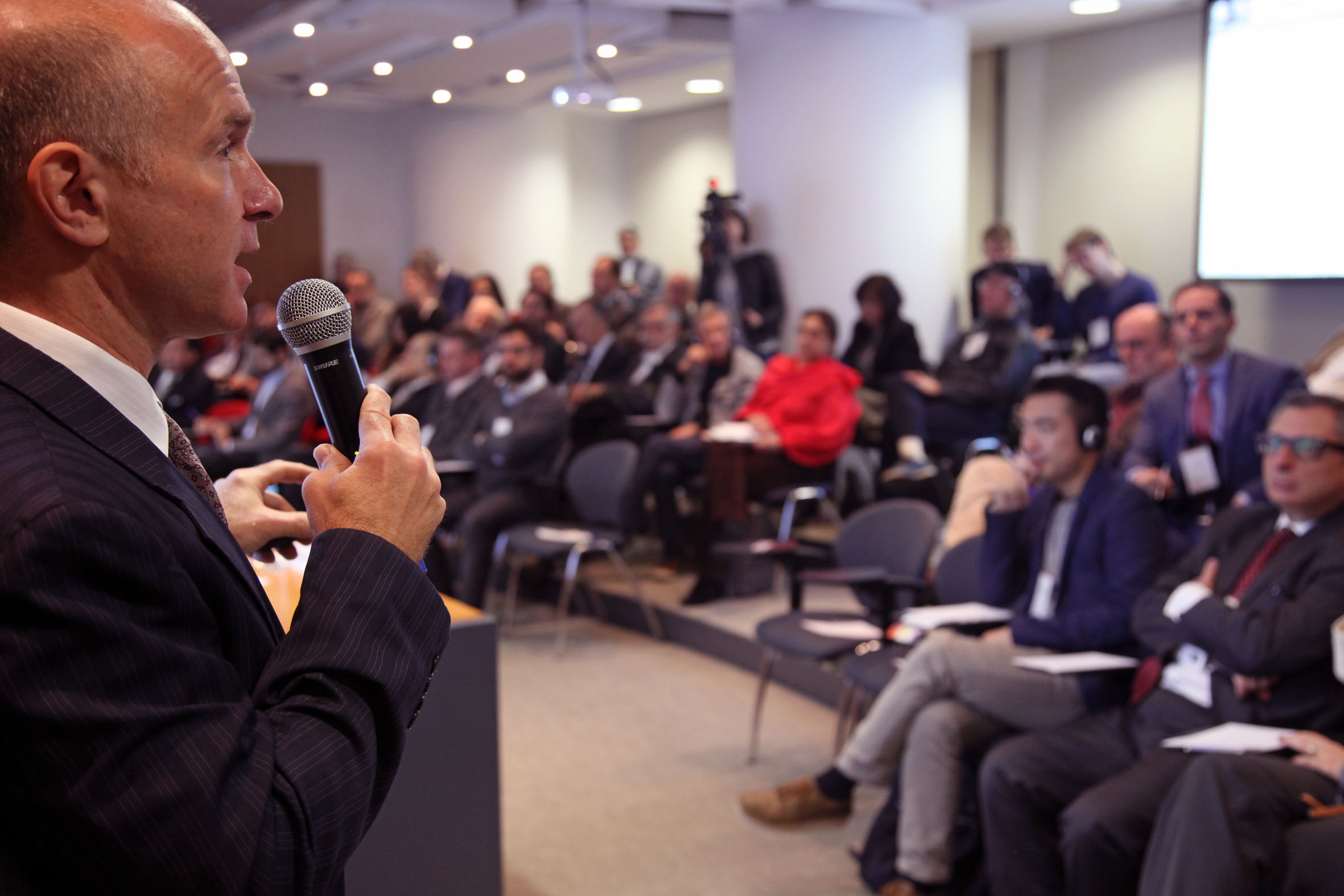
As part of what he called the “soft Chinese power”, Beijing has allocated more than 6,000 scholarships to young Latin Americans at Chinese universities and opened 39 Confucius Institutes with Mandarin teaching in the region - ten of them in Brazil in partnership with universities like Unicamp and Unesp, among others.
According to Ellis, China does not intend to interfere politically in any Latin American country, but is worried about protecting investments made by Chinese companies, as well as expatriate employees who live and work in places subject to conflict “Chinese companies have sought to better assess the risks involved in operations in certain Latin American countries and have realized that some projects, especially those with significant state participation, do not always deliver the expected results”, he said.
The consequence is that while “they avoid telling anyone how to play the government, Chinese companies have sent technical teams to improve the planning and coordination of the projects in which they are involved”.
“As a result of this more sophisticated approach, I think that, little by little, the idea that China would pose a threat to Latin America evolves into a more grounded view of the opportunities offered by the Asian country”, Ellis concluded.
A new 'elephant in the room'
The Western worldview, which prevailed over the past 500 years, had entered a crisis following the terrorist attacks of September 11, 2001 and the strengthening of radical Islamism in subsequent years. The global financial crisis that began in 2008, exposed the limits of liberal capitalism. The resilience of unemployment mainly in some European countries, a catalyst for new populism, and the crisis of traditional parties, both center-left and center-right, resulted in the emergence of new nationalist and xenophobic movements. All this contributed to the deep questioning of post-war international order (from 1945) and the impediment of the international system, which culminated with the election of Donald Trump into presidency in November 2016.
To Brazilian sociologist Bernardo Sorj, the emergence of China as a new world power brings “a new elephant in the room”. “Are we at the beginning of a new international power with a Chinese face? How are we going to live with this new economic, political and cultural reality that is being drawn from Asia? Especially at a time when the United States and Europe are going through an identity crisis and seems to be abandoning us?”, asked the director of the Edelstein Center for Social Research (based in Rio de Janeiro), commenting on Evan Ellis's speech.
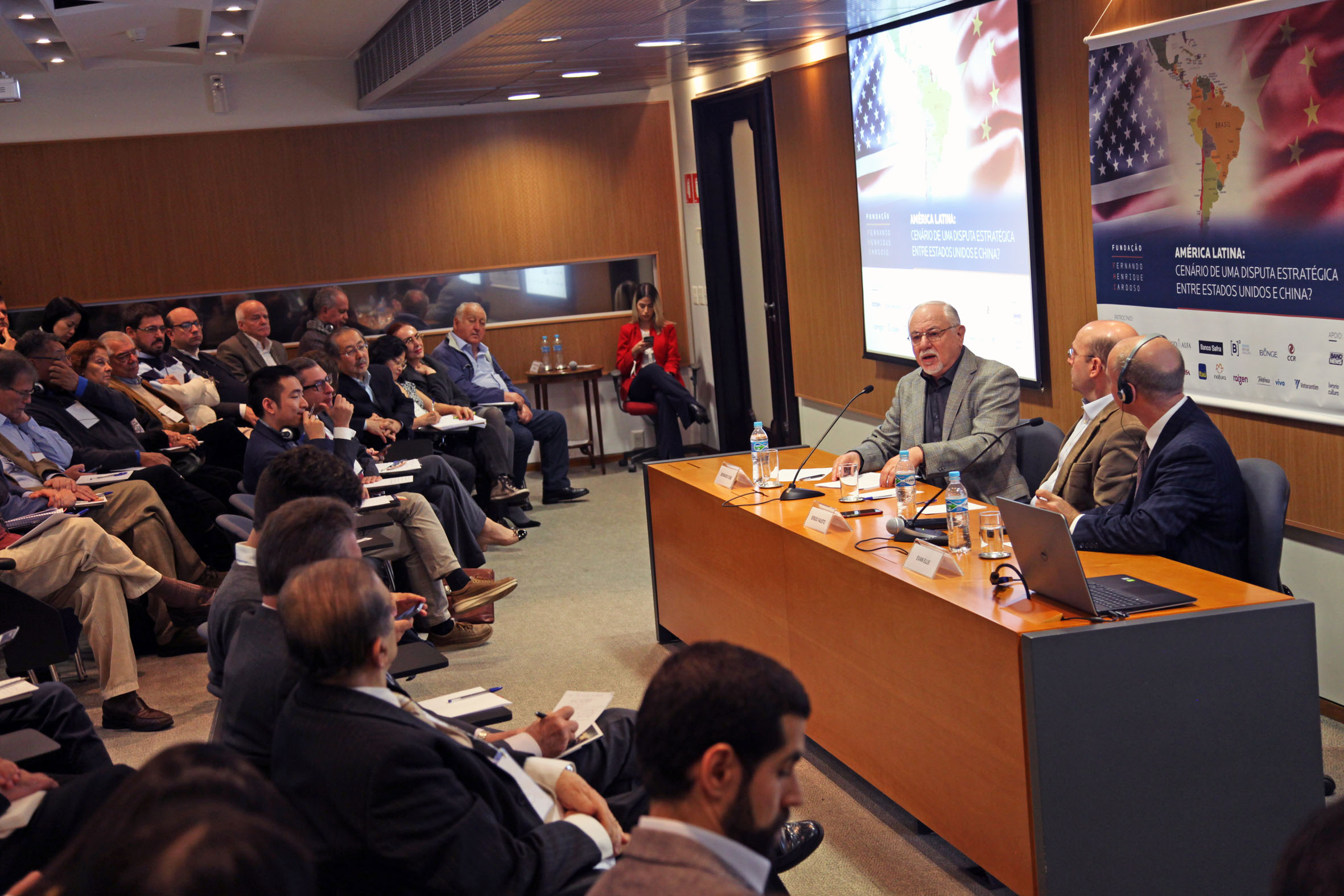
According to Sorj, Trump's victory should not be seen as a contingent occurrence, but as a medium and long-term trend. “The change that Trump represents can’t be reduced to his personality, and it reflects on the other side of the Atlantic. The developed societies that have driven globalization no longer feel capable of leading that process. Then there is space for China to act as a central player in the world”, told Sorj.
Although China is governed by a single-party (the Communist Party of China) authoritarian regime, and Latin America, despite its many difficulties, treads on paths of democracy, there are similarities between the Chinese discourse and the Latin American political tradition.
“In Latin America, right-wing as well as left-wing parties and politicians in general put emphasis on national sovereignty, in a statist perspective, and believe so-called social rights are always superior to that of civic and political rights”, said Sorj. “In this sense, elements of the Chinese discourse are closer to us, Latin Americans, than of the American and European type.”
Read also:
Global gridlock: how to overcome the crisis in international institutions
Is there a global decline in democracy? Round table with Larry Diamond
Martin Wolf: major trends in the global economy (in 9 charts)
Otávio Dias, journalist, is the content editor of the Fundação FHC. He was the Folha’s correspondent in London, editor of estadão.com.br and chief editor of the Brasil Post, a partnership between the Huffington Post and Grupo Abril.
Translated by Thomas Garman








